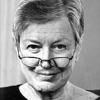Paula Fox

Paula Fox
Paula Foxis an American writer of novels for adults and children and of two memoirs. For her contributions as a children's writer she won the biennial, international Hans Christian Andersen Award in 1978, the highest international recognition for a creator of children's books. She has also won several awards for particular children's books including the 1974 Newbery Medal for her novel The Slave Dancer; a 1983 National Book Award in category Children's Fictionfor A Place Apart; and the 2008 Deutscher...
NationalityAmerican
ProfessionMemoirist
Date of Birth22 April 1923
CountryUnited States of America
The truth came slowly like a story told by people interrupting each other.
Words are nets through which all truth escapes.
To be human is to be in a story.
A year and a half after the end of the war and the German occupation, Paris was muted and looked bruised and forlorn. Everywhere I went, I sensed the tracks of the wolf that had tried to devour the city. But Paris proved inedible, as it had been ever since its tribal beginnings on an island in the Seine, the Ile de la Cité.
When I had a few francs, I spent them at a café on the Place de Longchamps, a block or so from my pension, where I could order a glass of Beaujolais and a plate of string beans in vinaigrette for the equivalent of fifteen cents.
And what movies we saw! All the actors and actresses whose photographs I collected, with their look of eternity! Their radiance, their eyes, their faces, their voices, the suavity of their movements! Their clothes! Even in prison movies, the stars shone in their prison clothes as if tailors had accompanied them in their downfall.
My life was incoherent to me. I felt it quivering, spitting out broken teeth.
A lie hides the truth. A story tries to find it.
The density of people in society is so thick that we forget that life will end one day. And we don't know when that one-day will be. So please, tell the people you love and care for that they are special and important. Tell them, before it is too late.
I don't like to listen to music while I'm working.
I have a painter's memory. I can remember things from my childhood which were so powerfully imprinted on me, the whole scene comes back.
I like to cook; it is, for me, a happy combination of mindlessness and purpose.
In my early twenties, that's when I really began to write. Before that, I was too busy working, keeping myself going.
My first job was working in a dress shop in Los Angeles in 1940, for $7 a week.